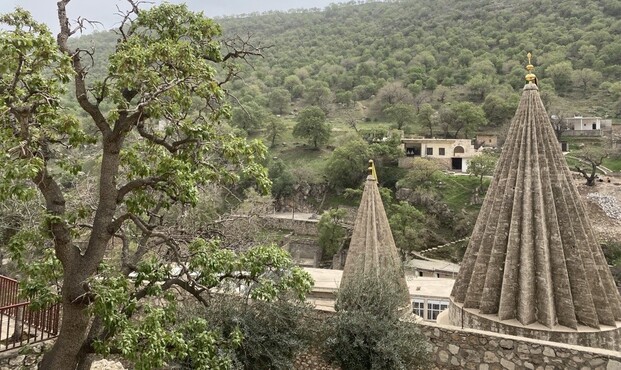Ten years on: GIZ continues to support the recovery and justice process for the Yazidi community

Photo credit: GIZ/Tawar Qaderi
In 2014, the so-called Islamic State (IS) enslaved and murdered thousands of Yazidis in Northern Iraq. Forced to flee the terror, even more Yazidis sought safety within the region, in improvised camps and outside. Many are still missing or displaced, and those who have returned to their homes struggle with recovery and seeking justice and reparation. In the Kurdistan Region of Iraq, GIZ, through the Civil Peace Service (CPS) programme and other project measures, supports the justice process and provides basic services for Yazidis, assisting them in their recovery. As we mark the 10th anniversary of the Yazidi genocide, we recognise the resilience of its people.
Achieving justice for the Yazidi community begins with investigating and documenting ISIS crimes. GIZ, through the CPS programme, supports the Kurdistan Regional Government’s Commission for Investigation and Gathering Evidence (CIGE) in their efforts to providing psychological and legal support to the Yazidi community. Since 2017, CIGE has reached nearly 3,000 family members of missing persons by providing psychosocial care and building legal cases. With the support of CPS, CIGE has built a new database. This database simplifies building legal cases, making it crucial to submit the numerous collected statements of victims and witnesses into a clearly defined judicial process. Additionally, CIGE and other partner organisations have conducted workshops on reparation policies and identification processes of missing persons.
One of the workshops revealed that many survivors of the genocide had misconceptions about psychological treatment, psychiatric medications and the role of psychologists and psychiatrists. For example, one anonymous participant, suffered from sleeping disorders because of the traumatic experiences she had faced. She went to the psychiatrist only once and started taking medications. Since the medication eased her suffering, she kept taking the medicine without further consultation. After the session she learned about the side effects and health risks, such as addiction, of taking medication without regular consultation. The awareness raising session had an immediate effect as she planned to get a consultation with her psychiatrist regularly. At the same time, she shared her knowledge with family and friends and made them aware of the risks of continuous medication and the services provided by psychologists.
CPS also works closely together with the Jiyan Foundation for Human Rights who runs treatment centres and has mobile teams to support the survivors of human rights violation.
Yazidi youth are integral to their community's peace and recovery efforts. CPS supported Dar Al-Taayesh "House of Coexistence" in Sinjar, which is a cultural and social hub. It offers a space for Yazidi and other local youth to engage in community dialogues, awareness initiatives, and social events that promote social cohesion. One notable activity was the production of podcast episodes on social cohesion and peaceful coexistence, which enabled youth to share their concerns and propose solutions, thereby encouraging understanding among communities.
Despite significant efforts in building peace and facilitating recovery for the Yazidi people, ongoing support is essential for their economic development. Through other projects implemented by GIZ, we aim to support economic stability and livelihoods alongside providing basic public services in the camps where Yazidis reside. These measures aim to strengthen the community's resilience and ensure a sustainable future.
Looking ahead, GIZ will continue its work to strengthen the capacities of civil society organisations and governmental institutions in dealing with the past and supporting the Yazidi community, especially in the pursuit of justice and mental well-being. Seconded CPS experts will closely work with partner organisations to support their efforts by providing training, technical advice, and fostering meaningful connections with national and international actors.
*For confidentiality reasons, the real name of the participant is not revealed.